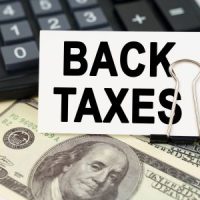Can I File Bankruptcy on Back Taxes?

Yes, bankruptcy takes care of back taxes. In fact, in many cases, back taxes are dischargeable in bankruptcy. Since back taxes are priority unsecured debts, like student loans and most employee wage claims, certain additional eligibility requirements apply. We’ll examine these requirements for discharge below. The modern, slimmed-down IRS often doesn’t start aggressive collection procedures for at least a year or two. By that time, the accumulated balance, plus the penalties and interest, is often crippling.
You can file bankruptcy on back taxes, but these matters are very complex. Only the most experienced Chicago bankruptcy lawyer should handle them. Bankruptcy/back tax matters often involve obscure legal loopholes and unwritten procedural rules. Therefore, only a lawyer who’s familiar with state laws, federal laws, and local procedures can successfully guide a case through the bankruptcy process and secure a fresh start for honest yet unfortunate debtors.
Discharge in a Chapter 7
Most unsecured debts, like credit cards and medical bills, are automatically dischargeable in a Chapter 7, unless there’s evidence of fraud or other severe misconduct. Since back taxes are government-affiliated debts, special discharge rules apply. The formal rules are all a matter of timing:
- Three Years: The tax debt to be discharged must be at least three years old. This delay usually means the IRS has attempted to collect the debt on its own. Frequently, however, these efforts haven’t gone very far past the threatening letter stage.
- Two Years: Taxpayer-filed returns must have been with the IRS for at least two years. The substitute returns that the IRS files on a taxpayer’s behalf when s/he doesn’t file one do not count. Bear in mind that extensions, if granted, affect the due date.
- 240 Days: This rule derails many discharge applications. Back taxes are nondischargeable if the IRS has assessed the debt within the past eight months. An attorney must examine a tax transcript to determine when the IRS last assessed the debt. Generally, however, the IRS assesses tax debt before it sends a letter that includes the total amount due.
Speaking of automatic things in bankruptcy, the Automatic Stay blocks IRS collection efforts until the bankruptcy judge formally closes the Chapter 7. A good Chicago bankruptcy lawyer can usually delay formal closing for several months, giving these debtors additional relief.
Section 362 of the Bankruptcy Code also blocks most other creditor adverse actions, such as foreclosure, wage garnishment, and repossession.
As a rule of thumb, these adverse actions are easy to block but almost impossible to undo. So, if you receive one of the aforementioned threatening letters from the IRS, speak with an attorney ASAP to preserve your rights. The IRS is the world’s largest collection agency with tools that other debt buyers dream of having. Bureaucrats don’t hesitate to use these tools to collect back taxes.
Repayment in a Chapter 13
If the tax debt isn’t dischargeable, Chapter 13 repayment is a good option. Most Chapter 13 debtors have five years to repay back taxes and other allowed claims. Since the Automatic Stay remains in full force and effect, at least in most cases, debtors can repay back taxes and other allowed claims at their own pace, as long as the repayment plan meets minimal legal requirements.
Debt mediation in a Chapter 13 often assists repayment. When a Chicago bankruptcy lawyer files a motion to discharge back taxes, a lawyer typically files a motion for mediation as well. Even if judges refuse to discharge taxes, they almost always grant motions to mediate, especially in certain jurisdictions.
This action triggers a duty to negotiate in good faith. So, even if the debtor isn’t clearly eligible for discharge, the IRS must compromise and offer to reduce the debt, in order to avoid a trial.
Work With a Thorough Cook County Lawyer
No matter what kind of financial problem you are having, bankruptcy could be a way out. For a confidential consultation with an experienced bankruptcy attorney in Chicago, contact the Bentz Holguin Law Firm, LLC. Convenient payment plans are available.
Source:
orb.uscourts.gov/faq/how-do-i-know-if-debt-secured-unsecured-priority-or-administrative


